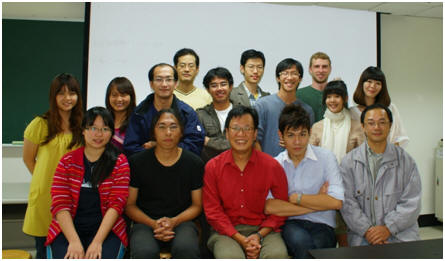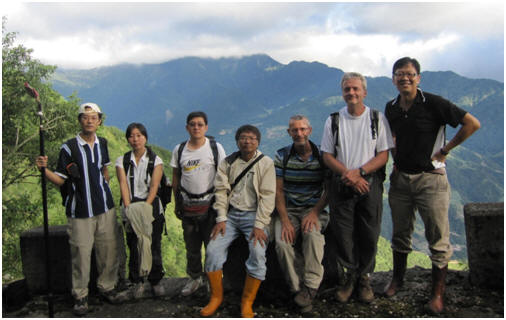|
|
| >Home >Faculty
>Chun-Neng Wang, Associate
Professor |
| Chun-Neng Wang, Associate
Professor |
|
|
 |
|
|
Title |
Associate Professor |
| Education |
Post-Doc, Botanical garden,
University of British Columbia, Canada
Ph.D. Edinburgh University & Royal Botanic
Garden Edinburgh, U. K |
| Specialty |
Plant morphogenesis and development,
molecular evolution,
phylogeography, plant reproductive biology |
| E-mail |
LEAFY@ntu.edu.tw |
| Lab |
Lab of developmental genetics
and evolution, Life Science Building R1204 |
| Tel |
+886-2-33664537 |
| Fax |
+886-2-23686750 |
| Website |
http://homepage.ntu.edu.tw/~leafy/ |
|
|
| |
-
Morphogenesis and developmental genetics
of flower shape, anisocotyly and bulbils
-
Phylogeography of East Asia relic
gymnosperm and endemic angiosperm
species
-
Molecular phylogenetics, phylogeography
and polyploidization of ferns
|
|
Lab Introduction:
Plant evo-devo Lab |
|
|
My research focuses on: (1) understanding the
evolutionary developmental genetics of flower
shape, anisocotyly and bulbil development in
respects to floral symmetry and ectopic meristem
formation; (2) resolve the phylogeographic
patterns and speciations of East Asia endemic
species, especially relic gymnosperms,
disjunctly distributed ferns and flowering
plants, by integrating evidence from morphology,
cytology, breeding and molecules.
My laboratory has taken an
evo-devo approach to study the evolution of
floral bilateral symmetry in Gloxinia (Sinningia
speciosa), the
evolution of anisocotyly and anisophyly in
Streptocarpus rexii
and other Gesneriaceae
species, and the development of bulbils
inflorescence in
Titanotrichum oldhamii.
The strategies include using fluorescence
cytological stains to identify meristem
positions, hormone treatments on cotyledon
development, real-time PCR and in-situ
hybridizations to examine candidate genes’
expression patterns and artificial crossings for
genetic analysis. I developed
a transformation protocol in
S. speciosa
allowing functional analysis of these
developmental genes. We aim to elaborate
Gesneriaceae species as a model
to
gain insight into the evolution of body plans
and various life history traits that exemplify
vascular plants.
I also use an
explicit comparative phylogeography framework to
examine
evolutionary, ecological and
spatial processes have shaped the present day
distribution and population structure of East
Asia relic and endemic species. I am interested
in the application of genetic markers and DNA
analysis, such as chloroplast and nuclear
barcoding markers, genome-wide AFLP and
microsatellite analysis, to answer questions
regarding population history, population genetic
structure, hybridizations, polyploidization,
adaptation and for conservation suggestions.
Analysis of molecular data on these
representative ferns, gymnosperm and angiosperm
species should provide us a
working hypothesis that explain high endemism
and the great biodiversity of Taiwan flora.


Fig. 2. Lab members in 2010

Fig. 3. A collecting trip
of
Taxus sumatra
in central mountain ridges of Taiwan
|
|
| |
|
* denotes corresponding author
-
-
Kuo L-Y, Ebihara A,
Kato M, Rouhan G, Ranker TA, Wang
C-N*, Chiou W-L (2017).
Morphological characterization of
infra-generic lineages in Deparia (Athyriaceae:
Polypodiales). Cladistics (in
press)
-
Nishii K, Huang BH, Wang
CN, Moller M (2017). From
shoot to leaf: step-wise shifts in
meristem and KNOX1 activity
correlate with the evolution of a
unifoliate body plan in Gesneriaceae. Development
Genes and Evolution 227:
41-60.
-
Nishii K, Huang BH, Wang
CN, Moller M (2017). From
shoot to leaf: step-wise shifts in
meristem and KNOX1 activity
correlate with the evolution of a
unifoliate body plan in Gesneriaceae. Development
Genes and Evolution 227:
41-60.
-
Kuo L-Y, Ebihara A, Shinohara W,
Rouhan G, Wood KR, Wang
C-N*, Chiou W-L (2016).
Historical biogeography of the fern
genus Deparia (Athyriaceae)
and its relation with polyploidy. Molecular
Phylogenetics and Evolution 104:123-134.
-
Kuo L-Y, Chang Y-H, Glowienka JMO,
Amoroso VB, Dong S-Y, Kao T-T, Wang
C-N*, Chiou W-L (2016). A
revised framework of Dryopteris subg. Nothoperanema(Dryopteridaceae)
Inferred from Phylogenetic Evidence,
with Descriptions of Two New
Sections. Systematic
Botany 41:596-605.
- Wang
C-N,
Hsu H-C, Wang C-C, Lee T-K, Kuo Y-F
(2015). Quantifying floral shape
variation in 3D using microcomputed
tomography: a case study of a hybrid
line between actinomorphic and
zygomorphic flowers. Frontiers
in Plant Science 6:
724.
-
Yang C-Y, Huang Y-H, Lin C-P, Lin
Y-Y, Hsu H-C, Wang
C-N, Liu L-Y, Shen B-N, Lin S-S
(2015). MicroRNA396-Targeted SHORT
VEGETATIVE PHASE Is Required to
Repress Flowering and Is Related to
the Development of Abnormal Flower
Symptoms by the Phyllody Symptoms1
Effector. Plant
Physiology 168:
1702-1716.
-
Hsu H-C, Chen C-Y, Lee T-K, Weng
L-K, Yeh D-M, Lin T-T, Wang
C-N*, Kuo Y-F (2015).
Quantitative analysis of floral
symmetry and tube dilation in an F2
cross ofSinningia seciosa. Scientia
Horticulturae 188:
71-77.
-
Zhang W-Y, Kuo L-Y, Li F-W, Wang
C-N*,
Chiou W-L (2014). The hybrid origin
ofAdiantum meishanianum (Pteridaceae):
A rare and endemic species in
Taiwan. Systematic
Botany 39:
1034-1041.
-
Pan Z-J, Chen Y-Y, Du J-S, Chen Y-Y,
Chung M-C, Tsai W-C, Wang
C-N,
Chen H-H (2014). Flower development
of Phalaenopsis orchid
involves functionally divergentSEPALLATA-like
genes. New
Phytologist 202:
1024-1042.
-
Nishii K, Ho M-J, Chou Y-W, Gabotti
D, Wang
C-N*,
Spada A, Möller M (2014). GA2 and
GA20-oxidase expressions are
associated with the meristem
position in Streptocarpus
rexii (Gesneriaceae). Plant
Growth Regulation 72:
123-140.
-
Hsieh Y-C, Chung J-D, Wang
C-N,
Chang C-T, Chen C-Y, Hwang S-Y
(2013). Historical connectivity,
contemporary isolation, and local
adaptation in a widespread but
discontinuously distributed species, Rhododendron
oldhamii, endemic to Taiwan. Heredity 111:
147-156.
-
Huang C-T, Hsieh C-F, Wang
C-N* (2013). Remusatia
yunnanensis (Araceae):
A Newly Recorded Species in Taiwan. Taiwania,
58:76-79.
-
Huang C-T, Hsieh C-F, Wang
C-N* (2013). Remusatia
yunnanensis (Araceae):
A Newly Recorded Species in Taiwan. Taiwania,
58:76-79.
-
Nishii K, Nagata T, Wang
C-N,
Möller M (2012). Light as
environmental regulator for
germination and macrocotyledon
development in Streptocarpus
rexii (Gesneriaceae). South
African Journal of Botany 81:
50-60.
-
Chen C-W, Kuo L-Y, Wang
C-N,
Chiou W-L (2012). Development of PCR
primer set for intron 1 of the
low-copy gene LEAFY in
Davalliaceae. American
Journal of Botany, 99, e223-225.
|
| |
|
B44 U1420
Evolutionary Biology
B44 U1650
Molecular Plant development and evolution
B44 U1760 Techniques in Plant Molecular Development
|
|
|
|
|
|